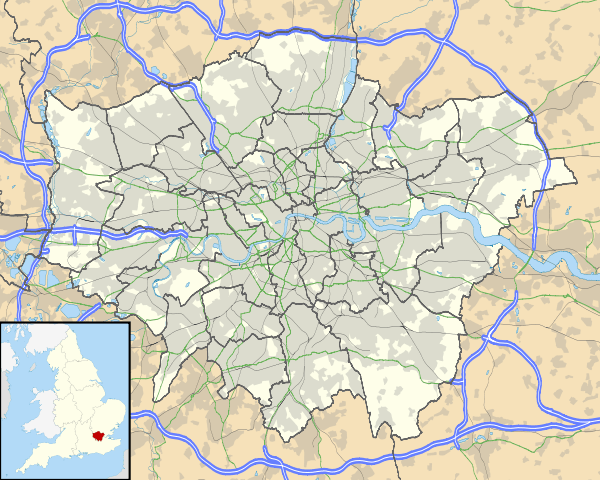South Woodford tube station
| South Woodford | |
|---|---|
|
Western entrance on George Lane | |
 South Woodford Location of South Woodford in Greater London | |
| Location | South Woodford |
| Local authority | London Borough of Redbridge |
| Managed by | London Underground |
| Number of platforms | 2 |
| Accessible | Yes (Eastbound only)[1] |
| Fare zone | 4 |
| London Underground annual entry and exit | |
| 2012 |
|
| 2013 |
|
| 2014 |
|
| 2015 |
|
| Railway companies | |
| Original company | Eastern Counties Railway |
| Pre-grouping | Great Eastern Railway |
| Post-grouping | London & North Eastern Railway |
| Key dates | |
| 1856 | Opened |
| 1947 | Transfer to London Underground |
| 1964 | Goods yard closed[3] |
| Other information | |
| Lists of stations | |
| WGS84 | 51°35′30″N 0°01′39″E / 51.5916°N 0.0275°ECoordinates: 51°35′30″N 0°01′39″E / 51.5916°N 0.0275°E |
|
| |
South Woodford, originally George Lane, is a London Underground station in South Woodford of the London Borough of Redbridge. It is on the Epping branch of the Central line, between Snaresbrook and Woodford stations and is in Travelcard Zone 4.[4]
History
The station opened as "George Lane" on 22 August 1856 as part of the Eastern Counties Railway branch to Loughton, which was eventually extended to Epping and Ongar in 1865. The station then formed part of the Great Eastern Railway's system until that company was merged into the London & North Eastern Railway (LNER) in 1923. On 5 July 1937 the station was renamed "South Woodford (George Lane)".[5]
The station was subsequently transferred to form part of London Underground's Central line on 14 December 1947 when Central line services were extended from Leytonstone to Woodford.[6] This formed a part of the long planned, and delayed, Eastern Extension of the Central line that was part of the London Passenger Transport Board's "New Works Programme" of 1935 - 1940. After transferring to London Underground the "(George Lane)" suffix fell out of use, though it remains on some roundel signs.[7][note 1]
During the planning of the Victoria line, route options included a continuation of the line from Walthamstow Central to Woodford or South Woodford stations.[8] However, in 1961, the decision was taken to build only as far as Walthamstow Central.[9]
The station today
The station has two entrances, one on each side of the line. George Lane originally crossed the railway tracks with a level crossing immediately to the north of the station, but this was closed and the road split into two when the line was electrified.[10] The footbridge can be used without a ticket, as unusually for stations on the Epping branch, the footbridge is outside the ticket gateline.[11] The station has step-free access to and from the eastbound platform only.[1]
Station improvements
The station underwent considerable renovations in 2006, 150 years after its first opening. Five new CCTV cameras were installed in the station underpass with the intention of improving security and in addition to the multimillion-pound station refurbishment work being undertaken due to crime statistics showing South Woodford station having the highest record of violent crime in Redbridge and the underpass was seen as a security risk, particularly after dark.[12] The rebuilding of the section of westbound platform damaged by fire was also completed and the paint scheme was a mix of white, blue and orange. However, the footbridge over the tracks at the east end hasn’t been repainted.[13]
Services and connections
Train frequencies vary throughout the day, but generally operate every 3–7 minutes between 07:03 and 22:39 eastbound[14] and between 06:22 and 22:19 westbound.[15]
London Bus routes 179, 549, W12, W13 and W14, and night route N55 serve the station.[16]
Notes and references
Notes
References
| Wikimedia Commons has media related to South Woodford tube station. |
- 1 2 "Step free Tube Guide" (PDF). Transport for London. Archived (PDF) from the original on 3 June 2015.
- 1 2 3 4 "Multi-year station entry-and-exit figures" (XLS). London Underground station passenger usage data. Transport for London. April 2016. Retrieved 3 May 2016.
- ↑ Hardy, Brian, ed. (March 2011). "How it used to be - freight on The Underground 50 years ago". Underground News. London Underground Railway Society (591): 175–183. ISSN 0306-8617.
- ↑ Transport for London (January 2016). Standard Tube Map (PDF) (Map). Not to scale. Transport for London. Archived (PDF) from the original on 3 January 2015.
- 1 2 Harris, Cyril M. (2006) [1977]. What's in a name?. Capital Transport. p. 64. ISBN 1-85414-241-0.
- 1 2 Rose, Douglas (1999) [1980]. The London Underground, A Diagrammatic History (7th ed.). Douglas Rose/Capital Transport. ISBN 1-85414-219-4.
- ↑ Tube Facts - Tube Stations with other/alternative names
- ↑ "Public Passenger Transport, London". Hansard. 18 December 1963.
- ↑ Horne, M.A.C. (1988). The Victoria Line: A short history. London: Douglas Rose. ISBN 978-1-870354-02-8.
- ↑ Powell, W. R. (ed.) (1973). "Woodford: Introduction". A History of the County of Essex. 6. Victoria County History. pp. 338–44.
- ↑ Google Maps - South Woodford Underground Station
- ↑ Edited Press Releases Transport for London London Underground - Metronet improves security at South Woodford (page 7)
- ↑ "Station Refurbishment Summary" (PDF). London Underground Railway Society. July 2007. Retrieved 19 February 2015.
- ↑ "Central line timetable: From South Woodford Underground Station to Woodford Underground Station". Transport for London. Retrieved 20 February 2015.
- ↑ "Central line timetable: From South Woodford Underground Station to Snaresbrook Underground Station". Transport for London. Retrieved 20 February 2015.
- ↑ "Buses from South Woodford" (PDF). Transport for London. 20 October 2013. Retrieved 20 February 2015.
| Preceding station | Following station | |||
|---|---|---|---|---|
| Central line Epping Branch | towards Epping |